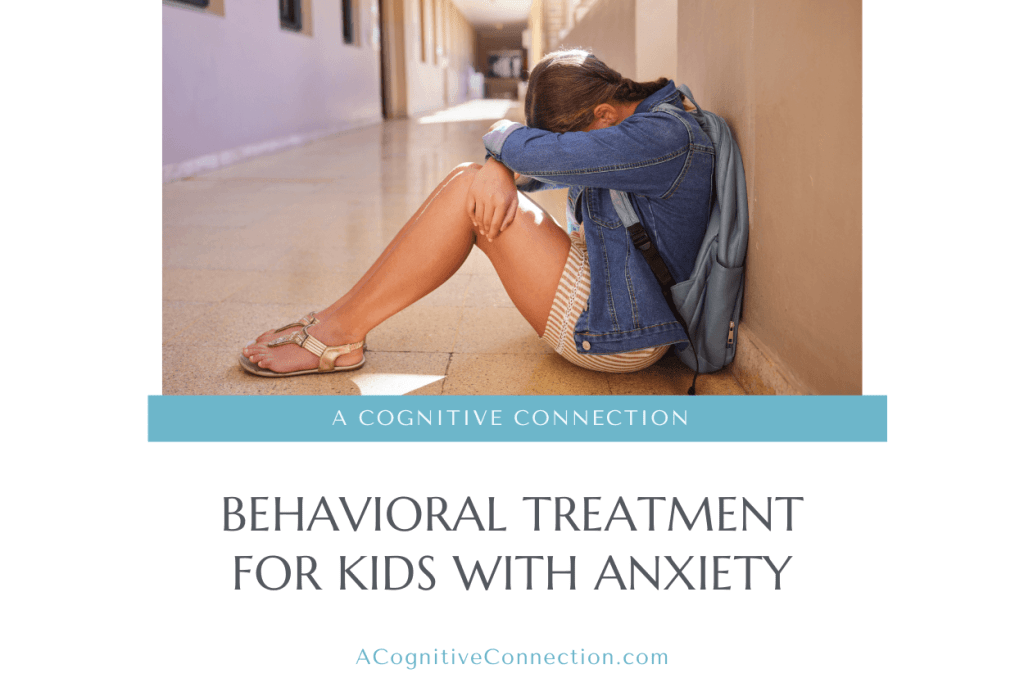Raising children with anxiety can be a challenging and heartbreaking experience for many parents. Watching them struggle with adult-level emotions is something no parent should ever experience.
But what if you could teach your children coping behaviors to help them combat their anxieties and fears? Transforming their mental processes in this way can give them the strength they need later in life and set them up for happier, healthier lives.
At A Cognitive Connection, we can help parents like you give their children the tools they need to manage their emotional health. Behavioral treatment for kids with anxiety helps replace negative thoughts and actions with positive ones to make them stronger. Fight back against anxiety by teaching your children these important coping tools with our team of experts.

Anxiety in Children is Increasing and Will Likely Worsen
Over the last few decades, child anxiety has skyrocketed and become endemic in many parts of the world. In 2012, about 11.6% of all children had anxiety. During the COVID-19 pandemic, those numbers jumped to 20.5%. Note: these are just reported cases of anxiety. There may be many more cases that don’t get noticed and are left untreated and become part of a child’s life.
What exactly caused this increase in anxiety? There are many complex factors at play here. The pandemic triggered a lot of fear and worry in many children, mainly when it was reported that younger kids may have a higher risk of death. However, other anxiety triggers are broader and may occur due to many other factors, including:
- Losing a loved one (especially a parent)
- Moving frequently to a new home
- Unsafe feelings (not enough to eat, family troubles, etc.)
- Inconsistent schooling (bullying especially)
- Fighting parents (or even neglect)
Please note that fear and anxiety aren’t necessarily the same thing. Fear occurs in the face of a reasonable danger, such as when parents drive too fast or fight excessively. Anxiety is a lingering and pressing fear that develops without present danger. For example, a child may worry about their parents dying constantly, even though they’re healthy and safe.
Normal fear isn’t a problem and may even be healthy. After all, children should be aware of life’s dangers and react to them appropriately. That said, pressing and chronic anxiety can cause lifelong emotional problems by becoming a child’s expected or persistent behavior pattern. Thankfully, behavioral therapy for anxiety in kids can help combat this issue safely.
Behavior Therapy for Anxiety in Children: The Basics
At its root, behavior therapy seeks to discover the source of a person’s (in this case, a child’s) actions and thoughts. Why do we react to things in certain ways? How come we fall into repeated cycles from which we can’t escape? Behavior therapy focuses on discovering and breaking these patterns by replacing them with healthier and better coping mechanisms.
Modern behavior therapy centers on two main techniques: cognitive behavioral therapy (CBT) and dialectical behavioral therapy (DBT). The theory behind both treatments is that your thoughts and behaviors impact your feelings and behavior, not necessarily your current situation. This explains how an anxious child anticipates dangers even in safe situations.

Cognitive Behavioral Therapy: An Industry Standard
CBT is likely the most common behavioral therapy for kids with anxiety. It’s a talk treatment available for children, teens, and adults. During therapy, your child will talk with a therapist and discuss their thoughts and emotions. This counselor comes up with a goal and sets specific sessions up to help a child learn how to cope with their anxiety and fearful nature.
During treatment, your child’s therapist will discover things like:
- What causes a child to feel anxious about life
- Potential triggers that could worsen your child’s fears
- Behavior patterns they may model after you or their other parent
- Self-defeating thoughts that limit their development
Using methods like play therapy (in which a child can role-play their problems), trauma-focused CBT (centered on traumatic events), and modeling (which includes restructuring behaviors and actions), CBT helps your child regain control of their thoughts. You’ll be there every step of the way, providing the support and guidance you can as their loving parent.
Dialectical Behavioral Therapy: A More Focused Approach
Psychologists developed dialectical behavior therapy (DBT) to help manage borderline personality disorder (BPD), a severe mental health problem that makes children and teens particularly unpredictable. However, DBT treatment can help with problems like anxiety, depression, and other emotional issues that may plague your child’s life.
DBT focuses on helping children develop a dialectical or opposite outlook in life, including acceptance of themselves and a willingness to change. During therapy, your child will learn to accept their anxiety. We don’t mean they just assume it is an unchangeable part of their personality. Instead, they acknowledge its existence without undue personal judgment.
From there, your child will learn four powerful and unique skills that can help them (and you) fight back against their anxiety, including:
- Mindfulness: Learning to live in the present moment while spotting anxious thoughts can help your child spot their anxiety triggers without giving in to them.
- Distress Tolerance: Mastering distressful situations (such as problems at school or fights with parents) through meditation and thoughtfulness helps children fight anxiety.
- Interpersonal Effectiveness: Teaching a child how to interact successfully with their peers, parents, and teachers can help reduce potential anxiety triggers.
- Emotion Regulation: Knowing how to spot anxiety early and managing it before it spirals can help your child cope more effectively with this emotional problem.
Our team at A Cognitive Connection can help you and your child choose between these and other behavior therapies. We’ll talk with your child about anxiety, figure out where it originates, and brainstorm a therapy that helps them stay healthy and robust as they age. We can even help you by teaching you simple talk-therapy techniques you can use with your child at home.

Stop Your Kid’s Anxiety Dead in Its Tracks With A Cognitive Connection
Teaching your children anxiety coping techniques early in their lives can help them face whatever fears come their way as adults. It’s a fantastic gift that can put them on the right emotional health path. Our team at A Cognitive Connection can help with your child’s anxiety behavioral therapy and will do whatever they can to keep them healthy. Give your child a new lease on life by contacting our team at A Cognitive Connection today to learn more!


